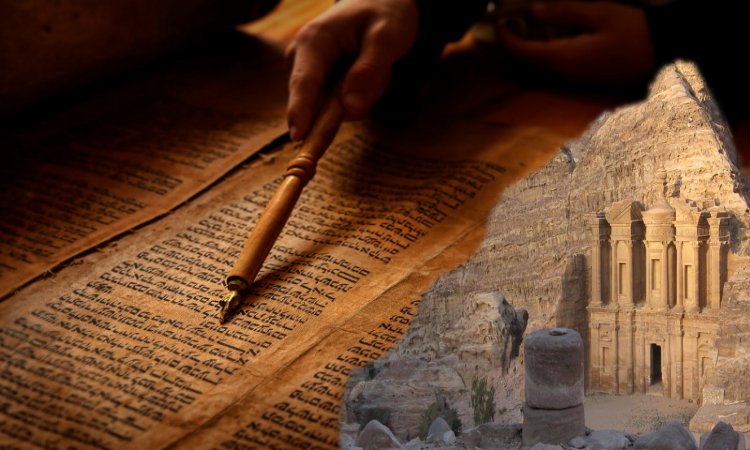Selah – Mysterious Biblical Word Of Unknown Meaning
Ellen Lloyd - AncientPages.com - Many Biblical scholars do not even attempt to translate the word Selah and those who try cannot agree on its meaning. Interestingly, the meaning of the word was unknown even to ancient Biblical commentators. Scholars have speculated its meaning since 270 B.C. when the Old Testament was translated into Greek.
The Hebrew word Selah is mentioned frequently in the Book of Psalms, seventy-four times in the Hebrew Bible, and three times in Habakkuk, the eighth book of the 12 minor prophets of the Hebrew Bible. It’s obviously an important word, but we do not know what it means.
The first time we see the word Selah in the Bible is in 2 Kings 14:7. More correctly translated as “Sela” it refers to a strong city and even the capital city of Edom which is surrounded by mountains. The Arabic equivalent is known as “Petra”, also called so by the Greeks, and in English we know it to mean rock.
The most popular and most frequently occurring use of the word Selah is in the Psalms, which the reason why many interpret it as meaning "silence" or "pause" at the end of a verse or at the complete end of the Psalm.
Others suggest the word means, "end," "a louder strain," "piano".
Selah is also thought to be rendered from two Hebrew words: s_lah, “to praise”; and s_lal, “to lift up.”
One possible Hebrew word related to Selah is Calah, which means “to hang” or “to measure or weigh in the balances.” Referring to wisdom, Job says, “The topaz of Ethiopia shall not equal it, neither shall it be valued with pure gold” (Job 28:19).
It’s also possible that Selah is a musical notation signifying a rest to the singers and/or instrumentalists who performed the psalms. If this is true, then each time Selah appears in a psalm, the musicians paused, perhaps to take a breath or to sing a cappella or let the instruments play alone.
However, music expert, Suzanne Haik-Vantoura is of a different opinion. She suggests Selah is not a musical notation. She thinks the word is part of the lyrics and like amen at the close of the prayer, Selah stresses the importance or reality of what was said.
Many people today are not even familiar with the word and, yet in the Bible, the Lord uses "Selah" twice as often as "Amen" and three times more than "Hallelujah".
Both the words Amen and Hallelujah are today recognized as international terms. It’s odd that the word Selah, which is used in over 25% of the Psalms is hardly known by most people.
Unfortunately, since the word’s etymology and precise meaning are unknown, we can only speculate about its purpose in the sacred texts.
Written by Ellen Lloyd – AncientPages.com
Copyright © AncientPages.com & Ellen Lloyd All rights reserved. This material may not be published, broadcast, rewritten or redistributed in whole or part without the express written permission of AncientPages.com and Ellen Lloyd
About the author:
Ellen Lloyd – is the owner of AncientPages.com and an author who has spent decades researching ancient mysteries, myths, legends and sacred texts, but she is also very interested in astronomy, astrobiology and science in general
More From Ancient Pages
-
 A Remarkably Well-Preserved Wooden Well Dating Back To The Bronze Age Uncovered In Benson, Oxfordshire
Archaeology | May 10, 2024
A Remarkably Well-Preserved Wooden Well Dating Back To The Bronze Age Uncovered In Benson, Oxfordshire
Archaeology | May 10, 2024 -
 January 2016: Lost Library Of John Dee Revealed In A Special Exhibition
Archaeology | Jan 24, 2016
January 2016: Lost Library Of John Dee Revealed In A Special Exhibition
Archaeology | Jan 24, 2016 -
 Ancient DNA Reveals How European Skin, Eye, And Hair Color Evolved Over The Past 45,000 Years
DNA | Feb 24, 2025
Ancient DNA Reveals How European Skin, Eye, And Hair Color Evolved Over The Past 45,000 Years
DNA | Feb 24, 2025 -
 Catastrophic Final Flooding Of Doggerland By The Storegga Tsunami – New Study Results
Archaeology | Dec 2, 2020
Catastrophic Final Flooding Of Doggerland By The Storegga Tsunami – New Study Results
Archaeology | Dec 2, 2020 -
 Wilhelm Tell: Famous Legendary Crossbowman And Swiss Patriot – Symbol Of Freedom And Dignity
Featured Stories | Nov 2, 2016
Wilhelm Tell: Famous Legendary Crossbowman And Swiss Patriot – Symbol Of Freedom And Dignity
Featured Stories | Nov 2, 2016 -
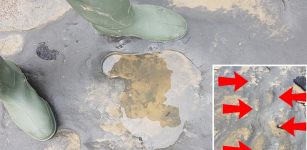 Oldest Footprints In Europe Belonged To A Mysterious 950,000-Year-Old Ancestor
Archaeology | Jul 22, 2019
Oldest Footprints In Europe Belonged To A Mysterious 950,000-Year-Old Ancestor
Archaeology | Jul 22, 2019 -
 Museum Classifies Roman Emperor Elagabalus As Trans – But Modern Labels Oversimplify Ancient Gender Identities
Featured Stories | Nov 28, 2023
Museum Classifies Roman Emperor Elagabalus As Trans – But Modern Labels Oversimplify Ancient Gender Identities
Featured Stories | Nov 28, 2023 -
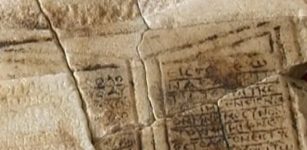 Last Fragment Of Early Christian Christogram Found In Ancient City Of Parthicopolis, Bulgaria
Artifacts | Sep 9, 2015
Last Fragment Of Early Christian Christogram Found In Ancient City Of Parthicopolis, Bulgaria
Artifacts | Sep 9, 2015 -
 How Was The Mysterious Menga Dolmen Built By Neolithic People? New Scientific Theory Presented
Archaeology | Aug 28, 2024
How Was The Mysterious Menga Dolmen Built By Neolithic People? New Scientific Theory Presented
Archaeology | Aug 28, 2024 -
 On This Day In History: George Bernard Shaw Died – On Nov 2, 1950
News | Nov 2, 2016
On This Day In History: George Bernard Shaw Died – On Nov 2, 1950
News | Nov 2, 2016 -
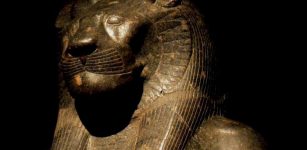 66 Diorite Statues Of Lion-Headed Goddess Sekhmet Discovered In Luxor, Egypt
Archaeology | Mar 9, 2017
66 Diorite Statues Of Lion-Headed Goddess Sekhmet Discovered In Luxor, Egypt
Archaeology | Mar 9, 2017 -
 ‘Lios na Grainsi’ – Ireland’s Largest Stone Circle
Civilizations | Feb 3, 2016
‘Lios na Grainsi’ – Ireland’s Largest Stone Circle
Civilizations | Feb 3, 2016 -
 Arsinoe II Rose To Power Through Manipulations, Murder, Conspiracies And Became Worshiped As A Goddess
Featured Stories | Apr 26, 2019
Arsinoe II Rose To Power Through Manipulations, Murder, Conspiracies And Became Worshiped As A Goddess
Featured Stories | Apr 26, 2019 -
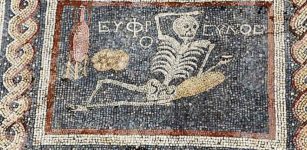 ‘Skeleton Mosaic’ – 2,400-Year-Old Scenes Depicted On Glass Artwork Found In Turkey
Archaeology | Apr 23, 2016
‘Skeleton Mosaic’ – 2,400-Year-Old Scenes Depicted On Glass Artwork Found In Turkey
Archaeology | Apr 23, 2016 -
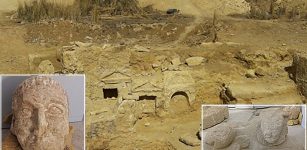 Remains Of Graeco-Roman Temple Discovered Near Egypt’s Siwa Oasis
Archaeology | Apr 6, 2018
Remains Of Graeco-Roman Temple Discovered Near Egypt’s Siwa Oasis
Archaeology | Apr 6, 2018 -
 Study Reveals Average Age That Women And Men Had Children Over Past 250,000 Years
DNA | Jan 10, 2023
Study Reveals Average Age That Women And Men Had Children Over Past 250,000 Years
DNA | Jan 10, 2023 -
 Merovingian Dynasty Of Long Haired Kings
Featured Stories | Jan 18, 2019
Merovingian Dynasty Of Long Haired Kings
Featured Stories | Jan 18, 2019 -
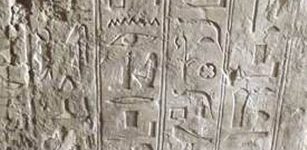 Tomb of the 26th dynasty vizier of Upper Egypt discovered in South Assassif, Luxor
Civilizations | Aug 31, 2015
Tomb of the 26th dynasty vizier of Upper Egypt discovered in South Assassif, Luxor
Civilizations | Aug 31, 2015 -
 Oseberg Ship: Amazingly Well-Preserved Viking Burial Ship
Featured Stories | Jun 15, 2016
Oseberg Ship: Amazingly Well-Preserved Viking Burial Ship
Featured Stories | Jun 15, 2016 -
 Ancient People Dressed Baby Boys In Blue To Ward Off Evil Spirits
Ancient History Facts | Mar 5, 2019
Ancient People Dressed Baby Boys In Blue To Ward Off Evil Spirits
Ancient History Facts | Mar 5, 2019

